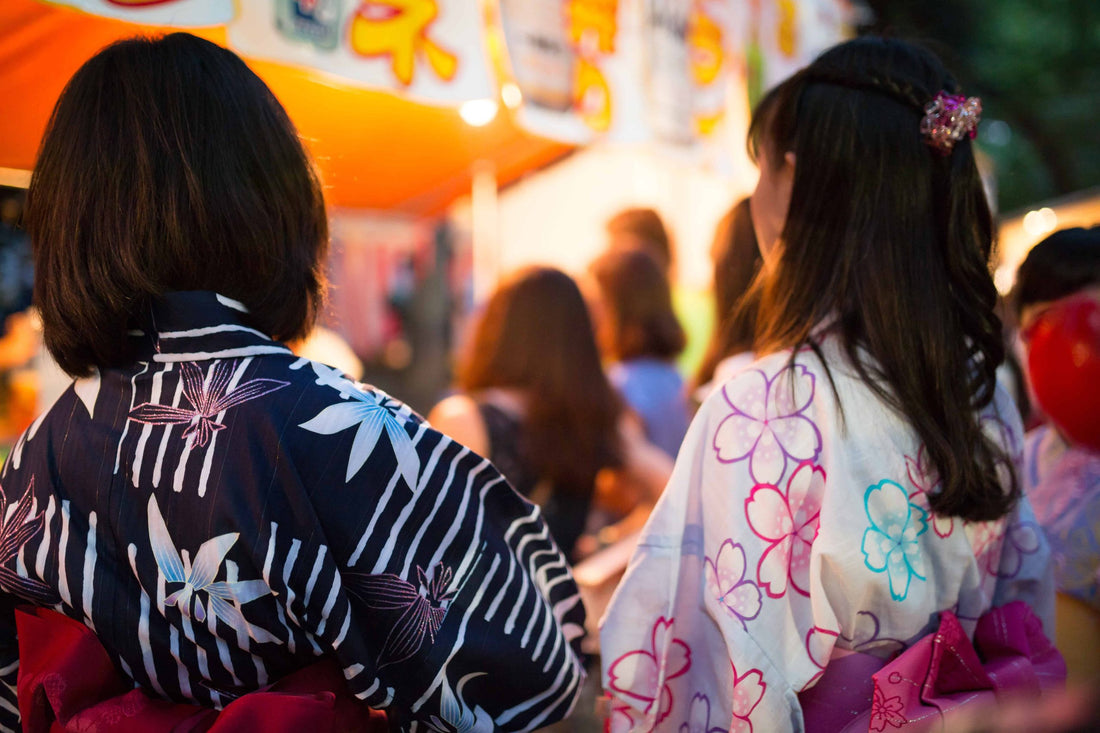The Japanese have cultural festivals abound, and they don't stop when the temperature (not to forget the humidity) ramp up! When you step outside into a Japanese summer, you'll realise you'd probably rather be naked... It's so hot! Luckily Japanese summer clothing exists, and you'll want to grab yourself some in no time. Traditional summer clothes include Yukata and Jinbei, which are commonly worn to cultural festivals such as Gion Matsuri in Kyoto! While we're on the subject, we've made plenty of informative blog posts on Japanese cultural festivals for you to read here.
Yukata
Yukata are similar to kimono in design and silhouette. The slim-fitting garment gives the wearer a filiform silhouette associated with elegance. However, yukata are made from cotton for a lightweight style perfect for humid Japanese summers. The popular Japanese summer clothing is considered perhaps a little more casual than its kimono cousin. Yukata are worn with hanhabi obi and heko obi. Obi means belt, and these are simply different ways of knotting and styling the obi. Ladies wearing yukata carry small items in small bags, their sode (sleeves) and even tucked into their obi. And don't forget, men wear yukata too! However their obi is worn lower, and wheras ladies yukatas often have bold prints, men's feature much simpler designs.
So how are yukata different from kimono?
Yukata are very similar to kimono in design. Yukata are cotton and lightweight, whereas kimono are traditionally made from silk or linen. You may also see a yukata worn at onsen (or bathhouses). This is because yukata are also worn to relax and dry off after using an onsen. If you take a closer look at a fully decked out kimono, you'll notice there are plenty more accessory items than worn with a yukata. With a yukata, not only are there far fewer items around your waist (in summer? thank goodness!), but tabi, or traditional split-toe socks are not usually worn. Although similar, the footwear is also slightly different: geta are worn with yukata and zori are worn with kimono!
Unlike yukata, you would wear a kimono for a wedding or formal occasion such as Seijin no Hi (or Coming of Age day)! A kimono is also recognisable by the han-eri (inner collar) of the naga-juban undergarment, obi-age (sash), and obijime (belt cord). Kimono are commonly worn with fukuro-obi and nagoya-obi. Here is a graphic showing the differences in finalised kimono and yukata outfits:
Finally a clear distinction between the two is in the price. Yukata are much cheaper, ranging from around £20-200, whereas kimono can range from around £150 to figures in the thousands! For more information, check out this handy guide to wearing yukata and kimono from Experience Suginami Tokyo.
Jinbei
Jinbei are lesser-known Japanese summer clothing worn by men. The lightweight two-piece consists of a jacket and shorts made from cotton. There's also a slight gap between the sleeves and the body of the jacket to allow for ventilation. Like yukata, Jinbei are also worn at matsuri, relaxing at home, or around your local neighbourhood. You can purchase jinbei for both genders and for kids too! The muted colours and simple patterns featured on jinbei are characteristic of traditional men's clothing in Japan. I really wish I'd bought myself a set from the local supermarket for chilling out in the humidity. They're very comfortable, and you could even wear the jacket over your western clothes in summer.
The Japanese Shop is situated in the sunny tropics of Harrogate, in the North of England. Okay, maybe it's not quite as hot and humid as Japan is this time of year, but you can still treat yourself or a loved one to an authentic Japanese Yukata for summer. The Green Ribbon Cotton Yukata and Black Cherry Blossom Yukata are my absolute favourites but they're all so beautiful. Wherever you are in the world, we hope you're having a lovely summer and staying cool!




